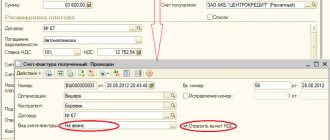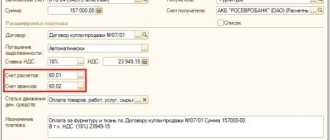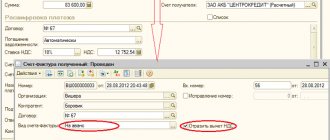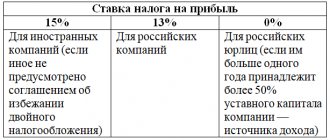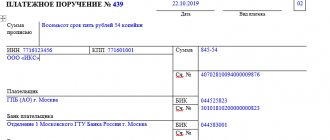Source: Magazine “VAT Problems and Solutions”
Anyone who deals with VAT-taxable and non-VAT-taxable transactions probably knows how many difficulties a taxpayer faces. One of them is associated with the so-called impersonal advances for the upcoming delivery of goods, when a certain amount (deposit) is received in the current account, which will be spent as the goods are shipped based on their cost and specifications. In what proportion should VAT be charged on the amount of prepayment received? What if an organization, in addition to non-taxable transactions, sells goods at different rates (18% and 10%)?
Accounting for advances from the seller
1. The following postings are made:
Dt 51 Kt 62 - prepayment received.
Dt 76 Kt 68 - VAT is reflected on the prepayment.
2. An advance invoice is being prepared (Article 169 of the Tax Code of the Russian Federation).
The supplier has 5 days to issue it. It is compiled in 2 copies: one for yourself, the second for the buyer. The rules for issuing invoices for advances received are regulated by Decree of the Government of the Russian Federation of December 26, 2011 No. 1137 (hereinafter referred to as Decree No. 1137).
For information on how to correctly fill out an advance invoice, see the material “Acceptance for deduction of VAT on advances received”
3. The advance invoice is recorded in the sales ledger.
The invoice is registered in the period in which the advance payment was received (clause 3 of the Rules for maintaining the purchase ledger, approved by Resolution No. 1137).
Next, the seller has 3 possible situations:
- there were no sales during the advance payment period;
- there was a sale during the period of transfer of the advance;
- the advance was returned to the buyer.
Option when there was no shipment during the advance payment period
The seller needs to enter the amount of the prepayment and VAT from the advance received in line 070 in columns 3 and 5, respectively, of section 3 of the VAT return (order of the Federal Tax Service of Russia dated October 29, 2014 No. MMV-7-3 / [email protected] ).
An option when the seller returned the advance to the buyer
- The seller accepts VAT on advances received for deduction (clause 5 of Article 171 of the Tax Code of the Russian Federation), making the following entries:
Dt 62 Kt 51 - refund of advance payment.
Dt 68 Kt 76 - acceptance of VAT on advances received for deduction.
- Reflects VAT for deduction in the purchase book.
- Fills out line 120 of section 3 of the VAT return.
Option for selling previously paid inventory items
- The seller accepts VAT from the advance received for deduction (clause 8 of Article 171 of the Tax Code of the Russian Federation), making the following entries:
Dt 62 Kt 90 - revenue received from sales.
Dt 90 Kt 68 - VAT is charged on sales.
Dt 68 Kt 76 - VAT on advances received is deducted.
- Shows the VAT deduction for advances received in the purchase book with the invoice number that was issued by the seller upon receipt of the advance.
- Fills out a declaration in which he enters the deduction on line 170 of section 3.
On the deadlines for accepting VAT for deduction, see the material “Deductions of “advance” and “agency” VAT cannot be postponed”
Note! Tax authorities believe that VAT is charged on advance payments received in any case, even if the periods of receipt of advance payment and sales coincide (letter of the Federal Tax Service of Russia dated July 20, 2011 No. ED-4-3/11684).
In addition, according to sub. 3 p. 3 art. 170 of the Tax Code of the Russian Federation, the seller, having sold goods and materials for an amount less than the advance payment, can deduct VAT only from the sale amount, and not from the entire prepayment.
For more information on the rules for deducting VAT on advances, see the material “Acceptance for deduction of VAT on advances received”
ConsultantPlus experts explained how to reflect advances received in the VAT return. Get trial access to the system and proceed to examples of filling out the report for free.
The dangers of incorrect entries
Incorrectly compiled invoices and incorrect entries in the purchase and sales books lead to VAT gaps (discrepancies).
They are identified by the tax authorities during a desk audit using the ASK VAT-2 PC system, which automatically compares the declarations of counterparties. Errors in accounting for advances lead to requests from the Federal Tax Service to explain the overstatement of the amount to be deducted. Gaps appear if the information about the transaction that the taxpayer reflected in Section 8 of the VAT return (purchase book) to confirm the right to apply a tax deduction does not coincide with the information that the taxpayer's supplier should have reflected in Section 9 of the VAT return (sales book). ). This could be an error in the details, submission of a zero declaration, or failure to submit at all. Another gap may be due to a discrepancy between the data in the taxpayer’s declaration and applications, including those from other periods.
Submit your VAT return online for free
Buyer's actions when making an advance payment
The buyer, by virtue of clause 12 of Art. 171 of the Tax Code of the Russian Federation can accept advance VAT for deduction if:
- there is a correctly executed invoice;
- there is a document confirming payment;
- The contract specifies the possibility of prepayment.
Having transferred the advance, the buyer:
- Makes the following entries:
Dt 60 Kt 51 - advance payment is transferred.
Dt 68 Kt 76 - advance VAT is deducted.
- Enters VAT deductions from advances issued in the purchase book with the invoice number issued by the seller.
- Reflects advance VAT on line 130 of section 3 of the VAT return.
- Restores advance VAT during the sales period: Dt 76 Kt 68.
- Reflects VAT restoration in the sales book.
- Reflects in the declaration VAT on advances on line 090 of section 3 (at rates 10/110 and 20/120).
On the issue of filling out line 090 of the declaration, see the material “How to fill out line 090 of section 3 of the VAT declaration”
See also: “Acceptance for deduction of VAT on advances issued”
What if the prepayment and the cost of shipping the goods do not match?
There will be no problems if the cost of shipment exceeds the prepayment, all VAT accrued on the advance payment will be deducted, the only difference will be the accrual of VAT on the shipment, which exceeds the tax on the prepayment and the amount accepted for deduction.
The situation becomes more complicated if the amount of the prepayment is greater than the cost of shipment, because then at the end of the period there remains part of the unfinished prepayment. It is also subject to tax at the top rate, increasing your tax liability. Example 2
Let's change the conditions of the previous example. Let's assume that an advance payment was received in the amount of 236 thousand rubles, and the same goods were shipped in the same quantity.
The following entries will be made in the organization's accounting:
| Contents of operation | Debit | Credit | Amount, rub. |
| Upon receipt of advance payment | |||
| Received prepayment for goods from the counterparty | 51 | 62-2 | 236 000 |
| VAT was charged on the advance at the rate of 18/ 118,236,000 rubles. x 18/118 | 76‑AV | 68-2 | 36 000 |
| When shipping goods | |||
| Sales of non-taxable goods reflected | 62-1 | 90‑1‑1 | 60 000 |
| The advance payment and the cost of shipment of non-taxable goods were offset | 62-2 | 62-1 | 60 000 |
| Reflects the sale of goods taxed at a rate of 10% | 62-1 | 90‑1‑2 | 100 000 |
| The advance payment and the cost of shipment of goods taxed at a rate of 10% were offset | 62-2 | 62-1 | 100 000 |
| VAT is charged at the rate of 10% RUB 100,000. x 10/110 | 90‑2‑2 | 68-2 | 9 091 |
| Accepted for deduction of tax on advance payment in terms of shipped goods and accrued tax | 68-2 | 76‑AV | 9 091 |
| Reflects the sale of goods taxed at a rate of 18% | 62-1 | 90‑1‑3 | 40 000 |
| An offset was made against the advance payment and the cost of shipment of goods taxed at a rate of 18% | 62-2 | 62-1 | 40 000 |
| VAT charged at the rate of 18% RUB 40,000. x 18/118 | 90‑2‑3 | 68-2 | 6 102 |
| Accepted for deduction of VAT from advance payment in terms of shipped goods and accrued tax | 68-2 | 76‑AV | 6 102 |
| Accepted for deduction of VAT relating to non-taxable and taxable at a reduced rate shipment of goods ((9,152 + 6,163) rub.) | 68-2 | 76‑AV | 15 315 |
The tax deductible from shipment will be 15,193 rubles.
(9 091 + 6 102). The accrued tax on the entire advance amount is RUB 36,000. The difference is 20,807 rubles. (36,000 - 15,193). How much of this difference is attributable to the non-taxable shipment and how much is due to the non-closed prepayment? When answering this question, one must also take into account the fact that part of the VAT on the prepayment was excessively charged due to the application of the wrong rate for goods taxed at a reduced rate. Let's start in order. The prepayment not covered by shipment is 36,000 rubles. (236,000 - 200,000), the amount of tax calculated from it is 5,492 rubles. (RUB 36,000 x 18/118). The portion of the excess tax accrued on prepayment related to the “10%” shipment will be RUB 6,163. (RUB 100,000 x 18/118 - RUB 100,000 x 10/110). As a result, the reverse method remains to calculate the VAT accrued on the prepayment, which relates to the non-taxable shipment. It is equal to 9,152 rubles. (20,807 - 5,492 - 6,163). Of these values, we deduct two (9,152 and 6,163), and leave the balance of VAT accrued on prepayment (RUB 5,492) until the next shipment. That is, the prepayment is closed by shipment, no more and no less.
The solution to the issue of impersonal prepayments, discussed in two examples, is not the only one. If a taxpayer has a share of goods whose sales are taxed at a rate of 10% exceeds the share of goods whose sales are subject to a rate of 18%, then it is more appropriate to apply a rate of 10/110 to impersonal prepayments. Then the difference between the VAT accrued on such advances and the calculated tax upon shipment of goods will be less, which indicates that the accountant was able to more accurately identify the advance and shipment for VAT calculation. If we return to the conditions of example 1, then the tax accrued at a rate of 10/110 on the entire advance payment will be equal to 18,182 rubles, and the tax on shipment will be 15,193 rubles. (9 091 + 6 102). The difference is 2,989 rubles, which is significantly less than the deduction balance – 15,315 rubles. (30,508 - 15,193) at an advance rate of 18/118. Thus, tax risks are reduced. In accounting, only the second (Debit 76-AV Credit 68-2 - 18,182 rubles) and the last entries (Debit 68-2 Credit 76-AV - 2,989 rubles) will be different, so we will not rewrite the entire example because of them. At the same time, due to the fact that the advance payment will be charged at a rate of 10/110, in relation to goods taxed at a rate of 18%, the tax from prepayment will be charged in a smaller amount than necessary. Tax authorities can point out this (and, by the way, quite rightly), to which the taxpayer can respond that the under-charge of 18% VAT is compensated by the accrual of an “advance” tax related to the non-taxable sale of goods. And besides, according to the results of shipment, the amount of tax was still less than that accrued from the prepayment, so no damage was caused to the budget.
Due to the fact that in Ch. 21 of the Tax Code of the Russian Federation does not establish a procedure for calculating VAT on prepayments received for the supply of goods taxed at different rates, as well as non-taxable ones; the taxpayer must consolidate its methodology in the accounting policy for tax purposes. Now the legislation has changed somewhat, so it is necessary to change the accounting policy, but there is no need to rush, since, alas, the amendments created create new problems for taxpayers.
When there is no need to charge VAT on advances received
A taxpayer may not charge VAT on an advance received in the following cases:
- when receiving an advance on non-taxable transactions (Article 149 of the Tax Code of the Russian Federation);
- if advances are made for operations the place of implementation of which is not the territory of the Russian Federation (Article 147, Article 148 of the Tax Code of the Russian Federation);
- the seller does not pay VAT as a “special regime” (Chapter 26.1–26.5 of the Tax Code of the Russian Federation);
- the seller is exempt from paying VAT (Articles 145 - 145.1 of the Tax Code of the Russian Federation);
- an advance payment was made for transactions with a VAT rate of 0% (clause 1 of Article 164 of the Tax Code of the Russian Federation);
- the advance payment is transferred for operations for which a long production cycle is provided - more than six months (clause 13 of article 167 of the Tax Code of the Russian Federation).
For information about who is not considered a VAT payer, see the material “Who is a VAT payer?”
GLAVBUKH-INFO
When you do not need to pay VAT on an advance paymentAs a general rule, when receiving an advance, the seller (performer) must charge VAT for payment to the budget. This follows from the provisions of paragraph 1 of Article 167 of the Tax Code of the Russian Federation, according to which the day of payment (partial payment) for upcoming deliveries of goods (performance of work, provision of services) is recognized as the moment of determining the tax base.
The following cases are exceptions to this rule:
- advance payments were received by an organization that is exempt from fulfilling obligations to pay VAT (Article 145 of the Tax Code of the Russian Federation);
- advance payments were received for the upcoming delivery of goods (performance of work, provision of services), the place of sale of which is not the territory of Russia (Articles 147, 148 of the Tax Code of the Russian Federation);
- advance payments received for upcoming deliveries of goods (performance of work, provision of services), subject to VAT at a rate of 0 percent (paragraph 4, paragraph 1, article 154 of the Tax Code of the Russian Federation);
- advance payments received for the upcoming delivery of goods (performance of work, provision of services), which are not subject to VAT (paragraph 5, paragraph 1, article 154 of the Tax Code of the Russian Federation);
- advance payments were received by manufacturers of goods (works, services), the duration of the production cycle of which is more than six months (clause 13 of article 167 of the Tax Code of the Russian Federation). The list of such goods (works, services) was approved by Decree of the Government of the Russian Federation of July 28, 2006 No. 468.
The chief accountant advises:
In order not to charge VAT on prepayments for goods (works, services) with a long production cycle, two conditions must be met.
Firstly, along with the VAT return for the period in which the prepayment was received, you will need to submit to the tax office:
- a copy of the contract with the buyer, certified by the signatures of the manager and chief accountant;
- a document confirming the duration of the production cycle of goods (works, services) indicating their name, production time, and the name of the manufacturing organization.
Such a document can be obtained from the Russian Ministry of Industry and Trade.
This follows from the provisions of paragraph 2 of paragraph 13 of Article 167 of the Tax Code of the Russian Federation, paragraph 1 of the Procedure approved by order dated October 6, 2009 of the Ministry of Industry and Trade of Russia No. 807, Roscosmos No. 138, Rosatom No. 686, and letter of the Federal Tax Service of Russia dated January 12, 2011 No. KE-4-3/65.
Secondly, the organization will be able to take advantage of the benefit only if the accountant organizes separate accounting:
- long production cycle operations and other operations;
- amounts of “input” VAT on goods (works, services), property rights that are used for the production of goods (works, services) of a long production cycle and other operations.
Such requirements are established by paragraph 13 of Article 167 of the Tax Code of the Russian Federation.
If any of the above conditions are not met, VAT on the advance payment for the manufacture of products with a long production cycle must be charged on a general basis. A deferment for calculating tax in the event that an advance payment is received in one tax period, but a document confirming the duration of the work is not provided in another. Such clarifications are contained in the letter of the Federal Tax Service of Russia dated January 12, 2011 No. KE-4-3/65. In addition, if a seller of products with a long manufacturing cycle has charged VAT on the advance received in one quarter and confirmed the right to the benefit in another quarter, he will not be able to reduce the tax base and reissue the invoice. In such a situation, the selling organization does not have the right to submit an updated tax return. This was stated in the letter of the Federal Tax Service of Russia dated October 11, 2011 No. ED-4-3/16809.
The procedure for maintaining separate accounting is not prescribed in the Tax Code of the Russian Federation. An organization can develop it independently and consolidate it in its accounting policies. In this case, one can take as a basis the method of separate accounting of transactions subject to and not subject to VAT (clause 4 of Article 170 of the Tax Code of the Russian Federation).
The main disadvantage of this benefit is that the organization can deduct the amount of “input” VAT on goods (work, services) purchased for production lasting more than six months only on the day of shipment of the manufactured products. That is, if an organization received an advance and did not pay VAT on it, then it will not be possible to recover from the budget the entire “input” VAT attributable to products with a long production cycle until these products are shipped. This procedure is provided for in paragraph 7 of Article 172 of the Tax Code of the Russian Federation.
In this regard, before exercising the right granted by paragraph 13 of Article 167 of the Tax Code of the Russian Federation, you need to evaluate the benefits of exemption from VAT on advance payments in exchange for a six-month (at least) deferment in deducting the “input” tax.
Situation: is it necessary to charge VAT on the amount of prepayment received in non-monetary form during a barter transaction?
Yes need.
VAT must be accrued for payment to the budget either on the day of shipment (transfer) of goods (performance of work, provision of services), or on the day of their payment - depending on which of these events occurred earlier. This is stated in paragraph 1 of Article 167 of the Tax Code of the Russian Federation. Prepayment is subject to VAT regardless of the form in which (cash or in kind) it is received (letters of the Ministry of Finance of Russia dated April 10, 2006 No. 03-04-08/77, Federal Tax Service of Russia dated February 28, 2006 No. MM-6-03 /202).
The amount of VAT calculated on the cost of the property that was received as an advance payment must be presented to the buyer by the supplier (paragraph 2, clause 1, article 168 of the Tax Code of the Russian Federation). To do this, within five days from the date of receipt of the advance payment, he is obliged to issue an invoice to the buyer. This follows from the provisions of paragraph 3 of Article 168 of the Tax Code of the Russian Federation and subparagraph “h” of paragraph 1 of Appendix 1 to Resolution of the Government of the Russian Federation of December 26, 2011 No. 1137.
The chief accountant advises: there are arguments that allow organizations not to charge VAT on the amount of prepayment received in non-monetary form during a barter transaction. They are as follows.
Under an exchange agreement, the counterparties receive ownership of the goods received simultaneously after they have fulfilled their obligations (Article 570 of the Civil Code of the Russian Federation). This means that the organization receives ownership of the goods only after it transfers its products to the counterparty. You can deviate from this rule only by stipulating a special procedure for the transfer of ownership in the contract. This means that until the goods are shipped to the counterparty, the received property must be taken into account on the balance sheet in account 002 “Inventory assets accepted for safekeeping” (unless otherwise specified in the contract). Since the organization is not the owner of the received property and cannot use it in its activities, it is impossible to recognize this property as an advance payment.
Considering that the above arguments contradict the official position of the Russian Ministry of Finance, the organization must make the final decision independently. However, if an organization refuses to charge VAT, it will have to defend its decision in court. Arbitration practice on this issue has not yet developed.
Situation: does the supplier need to charge VAT on the prepayment amount? Under the purchase and sale agreement, the prepayment was transferred not to his current account, but to the current account of the organization to which the supplier had accounts payable
Yes need.
The debtor (supplier) may entrust the fulfillment of its obligations to repay accounts payable to a third party (the buyer who made the advance payment). This follows from the provisions of paragraph 1 of Article 313 of the Civil Code of the Russian Federation. However, having thus reduced its debt to one creditor, the supplier increases it to another creditor. Therefore, the funds that the buyer transferred not to the supplier, but to his creditor, should be considered as an advance received against upcoming deliveries. Consequently, the supplier organization must calculate VAT on the prepayment amount, regardless of whose bank account it was received into. A similar position is reflected in the resolution of the Federal Antimonopoly Service of the Volga-Vyatka District dated March 15, 2004 No. A29-4792/2003A.
The amount of VAT calculated from the prepayment, which is transferred to the account of a third party, the supplier is obliged to present to the buyer (paragraph 2, paragraph 1, article 168 of the Tax Code of the Russian Federation). To do this, within five days from the date of receipt of the advance payment, he is obliged to issue an invoice to the buyer (clause 3 of Article 168 of the Tax Code of the Russian Federation).
The tax base
On the date of receipt of payment (partial payment) for upcoming deliveries of goods (performance of work, provision of services), the VAT tax base is determined based on the amount of payment received, including tax. This procedure is established by paragraph 1 of Article 154 of the Tax Code of the Russian Federation.
If the agreement is concluded in a foreign currency and provides for advance payment for goods (work, services) in this currency, the tax base for VAT is determined in rubles at the Bank of Russia exchange rate valid on the date of receipt of payment from the buyer (customer) (clause 3 of Article 153, Subparagraph 2, paragraph 1, Article 167 of the Tax Code of the Russian Federation).
Situation: how to calculate VAT if, when an organization receives an advance, it is not known how many goods (works, services) to be shipped on account of this advance will be subject to VAT, and which will be exempt from taxation
VAT must be charged on the entire amount of the advance received.
For example, this should be done if an advance was received for the supply of goods, some of which will later be sold in Russia, and some abroad. Once the actual quantity of goods (work, services) subject to VAT and not subject to taxation becomes known, the amount of tax overpaid on the advance payment can be returned or offset. To do this, you need to submit an updated declaration to the tax office for the quarter in which the advance was received.
Such clarifications are contained in letters of the Ministry of Finance of Russia dated November 8, 2012 No. 03-07-07/115 and dated October 21, 2008 No. 03-07-08/243.
Calculation procedure
Calculate the VAT that must be paid upon receiving an advance (partial payment) for upcoming deliveries:
– if the goods (work, services) with which the receipt of an advance payment is associated are subject to VAT at a rate of 18 percent:
| Advance amount (partial payment) | × | 18/118 |
– if the goods (work, services) for which the receipt of an advance payment is associated are subject to VAT at a rate of 10 percent:
| VAT accrued for payment to the budget | = | Advance amount (partial payment) | × | 10/110 |
This procedure is provided for in paragraph 4 of Article 164 of the Tax Code of the Russian Federation.
Invoice
The amount of VAT calculated from the advance payment (partial payment) must be presented to the buyer of goods (works, services) (paragraph 2, paragraph 1, article 168 of the Tax Code of the Russian Federation). To do this, within five days from the receipt of the advance (partial payment), the supplier must issue an invoice to the buyer. This is stated in paragraph 3 of Article 168 of the Tax Code of the Russian Federation. Based on this invoice, the buyer will be able to deduct the amount of VAT presented to him (clause 12 of article 171, clause 9 of article 172 of the Tax Code of the Russian Federation).
After the goods (work, services) on account of the received advance (partial payment) have been shipped (performed, provided), the supplier (performer) is obliged to re-charge VAT and issue a new invoice (clause 14 of article 167, clause 1 Article 154, paragraph 3 of Article 168 of the Tax Code of the Russian Federation). If the agreement was concluded in a foreign currency, the tax base must be recalculated in rubles at the Bank of Russia exchange rate in effect on the date of sale of goods (performance of work, provision of services) (clause 3 of Article 153 of the Tax Code of the Russian Federation).
Tax deduction
The supplier can deduct tax amounts previously accrued from the advance payment in two cases:
- if the goods (work, services), for the delivery of which an advance payment was received, are shipped (performed, provided) to the buyer. Accept tax as a deduction on the date of shipment - regardless of the conditions for the transfer of ownership from the supplier to the buyer (clause 8 of Article 171, clause 6 of Article 172 of the Tax Code of the Russian Federation);
- if the contract under which the advance payment was received is amended or terminated, and the advance amount is returned to the buyer. Accept the tax for deduction on the date of return of the advance payment (partial payment) (clause 4 of Article 172 of the Tax Code of the Russian Federation). A prerequisite for deducting VAT in this case is the payment of advance tax to the budget (clause 5 of Article 171 of the Tax Code of the Russian Federation). Moreover, if the advance payment is received and returned within one quarter, then the supplier has the right to accept tax as a deduction in the same tax period (letter of the Federal Tax Service of Russia dated May 24, 2010 No. ШС-37-3/2447 (agreed with the Ministry of Finance of Russia)).
An example of reflecting VAT transactions in accounting when returning an advance received
In the third quarter (September), OJSC “Proizvodstvennaya” received from CJSC “Alfa” a 100 percent prepayment under the purchase and sale agreement for finished products. The advance amounted to 118,000 rubles. (including VAT – 18,000 rubles).
According to the terms of the contract, finished products should be shipped to Alpha in the fourth quarter (October).
The amount of VAT calculated from the prepayment is reflected in the declaration for the third quarter (September) and paid to the budget in October.
By the deadline established in the contract, “Master” did not manage to produce the required quantity of products and did not deliver. On November 1, the contract between “Master” and “Alpha” was terminated. On the same day, “Master” returned to “Alfa” the advance received in the amount of 118,000 rubles. (including VAT – 18,000 rubles).
To account for settlements with customers on advances received, the “Masters” accountant uses the subaccount “Settlements on advances received”, opened to account 62.
The “Master” accountant reflected the operation to return the advance in accounting as follows:
Debit 62 subaccount “Settlements on advances received” Credit 51 – 118,000 rubles. – the advance amount was returned to the buyer;
Debit 68 subaccount “Calculations for VAT” Credit 76 subaccount “Calculations for VAT from advances received” – 18,000 rubles. – the amount of VAT accrued and paid from the prepayment amount is accepted for deduction.
An organization has the right to deduct VAT from the prepayment amount in an amount proportional to the cost of goods shipped (work performed, services rendered) (see, for example, letter of the Federal Tax Service of Russia for Moscow dated January 31, 2007 No. 09-14/8397).
An example of reflecting VAT transactions in accounting upon receipt of partial prepayment
In March, OJSC “Proizvodstvennaya” received a partial advance payment from CJSC “Alfa” towards the upcoming shipment of products. The prepayment amount is RUB 590,000.
Products worth RUB 944,000. (including VAT - 144,000 rubles) was shipped to Alfa in April. Its cost was 650,000 rubles.
According to the terms of the agreement, ownership of the products passes to Alpha after full payment. The remaining debt is 354,000 rubles. (944,000 rubles - 590,000 rubles) - “Alpha” transferred to “Master” after the products were shipped (in April).
To account for settlements with customers, the accountant uses sub-accounts opened to account 62 - “Settlements for advances received” and “Settlements for shipped products”. It reflects the accrual of VAT using the subaccount “VAT accrued on shipped but unsold goods” opened to account 76 “Settlements with various debtors and creditors”.
The following entries were made in the Master's accounting.
In March:
Debit 51 Credit 62 subaccount “Settlements on advances received” – 590,000 rubles. – partial prepayment was received from Alpha for the upcoming delivery of products;
Debit 76 subaccount “Calculations for VAT on advances received” Credit 68 subaccount “Calculations for VAT” - 90,000 rubles. (RUB 590,000 × 18/118) – VAT is charged on the prepayment amount.
In April:
Debit 68 subaccount “Calculations for VAT” Credit 51 – 90,000 rubles. – VAT is transferred to the budget from the prepayment amount (as part of the total tax amount according to the declaration for the first quarter);
Debit 45 Credit 43 – 650,000 rub. – products were shipped to Alpha;
Debit 76 subaccount “VAT accrued on shipped but unsold goods” Credit 68 subaccount “Calculations for VAT” - 144,000 rubles. – VAT is charged on shipped products;
Debit 68 subaccount “Calculations for VAT” Credit 76 subaccount “Calculations for VAT from advances received” – 90,000 rubles. – VAT accrued on prepayment is accepted for deduction.
Debit 51 Credit 62 subaccount “Settlements for shipped products” – 354,000 rubles. – the debt for payment for shipped products has been repaid;
Debit 62 subaccount “Settlements for shipped products” Credit 90-1 – 944,000 rubles. – revenue from the sale of products is reflected after full payment;
Debit 90-3 Credit 68 subaccount “VAT calculations” – 144,000 rubles. – VAT is charged on sales proceeds;
Debit 68 subaccount “Calculations for VAT” Credit 76 subaccount “VAT accrued on shipped but unsold goods” – 144,000 rubles. – VAT accrued upon shipment of products is accepted for deduction;
Debit 90-2 Credit 45 – 650,000 rub. – the cost of products sold is written off;
Debit 62 subaccount “Settlements for advances received” Credit 62 subaccount “Settlements for shipped products” - 590,000 rubles. - prepayment has been credited.
An example of reflecting VAT transactions in accounting when receiving an advance payment in foreign currency
ZAO Alfa provides educational services (conducts seminars) on orders from foreign organizations in Russia. The services provided by Alfa are subject to VAT (subclause 3, clause 1, article 148 of the Tax Code of the Russian Federation).
In January, Alpha entered into an agreement to conduct a seminar with the following conditions:
- the cost of educational services is USD 11,800 (including VAT – USD 1,800);
- advance payment of 100 percent is due on January 11;
- The seminar is held on January 27.
The conventional US dollar exchange rate was:
- on January 11 – 31 rubles/USD;
- on January 27 – 30 rubles/USD.
If a contract, the value of which is expressed in foreign currency, provides for partial (100%) prepayment, then in accounting the amount of the advance received (revenue) is not recalculated either on the reporting date, or on the date of shipment, or on the date of final settlements with the buyer (p 9 and 10 PBU 3/2006). Therefore, exchange rate differences do not arise under both agreements. A similar rule applies in tax accounting: when receiving an advance, the amount of proceeds from sales in the part attributable to the advance is determined at the exchange rate established on the date of receipt of the advance (paragraph 3 of Article 316 of the Tax Code of the Russian Federation). Since the procedure for recognizing revenue in accounting and tax accounting does not differ, permanent differences do not arise.
The tax base for VAT under such agreements is determined twice. First, in rubles at the Bank of Russia exchange rate valid on the date of receipt of payment from the customer (clause 3 of Article 153, subclause 2 of clause 1 of Article 167 of the Tax Code of the Russian Federation). After the services are actually provided, again in rubles at the Bank of Russia exchange rate in effect on the date of provision of services (clause 14 of article 167, clause 1 of article 154, clause 3 of article 153 of the Tax Code of the Russian Federation). At the same moment, the amount of VAT accrued from the prepayment is accepted for deduction (clause 6 of Article 172 of the Tax Code of the Russian Federation).
To reflect transactions related to receiving prepayments and providing educational services, I opened subaccounts to account 62 “Settlements with buyers and customers”:
- 62 subaccount “Settlements on advances received”;
- 62 subaccount “Settlements for services rendered”.
The following entries were made in accounting.
January 11:
Debit 51 Credit 62 subaccount “Settlements on advances received” – 365,800 rubles. (11,800 USD × 31 rubles/USD) – an advance was received to pay for services;
Debit 76 subaccount “Calculations for VAT on advances received” Credit 68 subaccount “Calculations for VAT” - 55,800 rubles. (RUB 365,800 × 18/118) – VAT is charged on the prepayment amount.
January 27:
Debit 62 subaccount “Settlements for services rendered” Credit 90-1 – 365,800 rubles. – revenue from the sale of services is reflected (at the exchange rate on the date of receipt of the advance).
To determine the tax base for VAT, the accountant calculated revenue at the US dollar exchange rate on the date of provision of services. It amounted to 354,000 rubles. (11,800 USD × 30 rubles/USD). The amount of VAT on the amount of revenue is 54,000 rubles. (RUB 354,000 × 18/118).
Debit 90-3 Credit 68 subaccount “VAT calculations” – 54,000 rubles. – VAT is charged on revenue from the provision of services;
Debit 62 subaccount “Settlements for advances received” Credit 62 subaccount “Settlements for services rendered” - 365,800 rubles. – the received advance is offset against payment under the contract;
Debit 68 subaccount “Calculations for VAT” Credit 76 subaccount “Calculations for VAT from advances received” – 55,800 rubles. – accepted for deduction of VAT on an advance payment. Situation: is it possible to deduct VAT paid to the budget from an advance payment for which goods (work, services) were not shipped (performed, provided). Accounts payable in the amount of the advance were written off due to the expiration of the limitation period
No you can not.
A deduction for tax accrued on an advance payment from the seller is possible in two cases:
- after shipment of goods (performance of work, provision of services) (clause 8 of Article 171, clause 6 of Article 172 of the Tax Code of the Russian Federation);
- upon termination (change of terms) of the contract and return of the corresponding advance payments to the counterparty. At the same time, a prerequisite for deducting VAT in this case is the payment of advance tax to the budget (clause 5 of Article 171, clause 4 of Article 172 of the Tax Code of the Russian Federation).
A deduction for VAT when writing off accounts payable in the amount of an unclosed advance is not provided for in Chapter 21 of the Tax Code of the Russian Federation.
It is also impossible to include the amount of VAT as expenses that reduce taxable profit. The fact is that the VAT, which the supplier pays to the budget when receiving an advance, is presented to the buyer (paragraph 2, paragraph 1, article 168 of the Tax Code of the Russian Federation). And the amounts of taxes charged to buyers are not taken into account in the sellers’ expenses (clause 19 of Article 270 of the Tax Code of the Russian Federation).
The seller will also not be able to take advantage of the provisions of subparagraph 14 of paragraph 1 of Article 265 of the Tax Code of the Russian Federation. This subclause allows you to take into account the amount of VAT in expenses only when writing off accounts payable for purchased goods (work, services). In the situation under consideration, the organization did not purchase anything - it only received funds as an advance payment for upcoming deliveries. In such a situation, there is no reason to reduce taxable profit by the amount of VAT on the advance payment, which is written off due to the expiration of the statute of limitations. The entire amount of the advance (including VAT) must be included in non-operating income (clause 18 of Article 250 of the Tax Code of the Russian Federation).
Similar clarifications are contained in the letter of the Ministry of Finance of Russia dated February 10, 2010 No. 03-03-06/1/58.
The chief accountant advises: there are arguments that allow you to take into account, when calculating income tax, the amount of VAT on an unearned advance payment, which the organization writes off after the expiration of the statute of limitations. They are as follows.
Situation: is it possible to deduct the entire amount of VAT from the advance payment under this agreement upon termination of the contract? The contractor returns only part of the advance amount to the customer. Before termination of the contract, the contractor incurred costs, the amount of which the customer reimburses by refusing to return part of the advance
Yes, you can.
Upon receipt of an advance payment from the customer for the execution of work (provision of services), the contractor must charge VAT on the entire amount received at the estimated rate and issue the customer an invoice with the allocated tax amount. Based on this invoice, the customer can accept the amount of VAT for deduction (clause 12 of Article 171 and clause 9 of Article 172 of the Tax Code of the Russian Federation).
Subsequently, the parties can terminate the contract without waiting for its final execution. Moreover, if the contractor incurred any costs associated with the start of execution of the contract, the customer must reimburse him for this amount (Article 782 of the Civil Code of the Russian Federation). One of the options for compensation for expenses incurred is for the contractor to retain part of the advance received. Since the amount of the partially withheld advance is not payment for work performed (services provided), the contractor should not charge VAT on this amount. The object of taxation in this case does not arise, because the implementation of works (services) on account of the previously received advance payment due to termination of the contract did not take place. This follows from the provisions of paragraph 1 of Article 39 and paragraph 1 of Article 146 of the Tax Code of the Russian Federation.
Upon termination of the contract, the contractor has the right to deduct the entire amount of VAT previously accrued from the prepayment, in part of the refundable amount (clause 8 of Article 171 of the Tax Code of the Russian Federation). Even if part of this prepayment was offset by the parties as compensation for expenses incurred by the contractor. In turn, the customer must fully refund the amount of VAT that he accepted for deduction from the previously transferred prepayment. This is stated in subparagraph 3 of paragraph 3 of Article 170 of the Tax Code of the Russian Federation.
An example of VAT calculation upon termination of a contract for the provision of services. The customer compensates the contractor for expenses incurred in connection with the commencement of execution of the contract
On June 1, 2012, Torgovaya LLC and Alfa CJSC entered into an agreement to provide information to Alfa, ordering it to conduct marketing research in one of the constituent entities of the Russian Federation and assess the prospects for selling its products on the regional market. As an advance payment under the agreement, Hermes transferred 236,000 rubles to Alpha.
To execute the contract, Alpha hired local specialists who carried out preliminary work to study the situation. However, in July, without waiting for the final report, Hermes refused the ordered services and demanded termination of the contract. At the same time, he agreed to reimburse all documented expenses incurred by Alpha in connection with the commencement of the contract.
On the amount of the prepayment received, Alpha charged VAT in the amount of 36,000 rubles. (RUB 236,000 × 18/118) and issued an invoice to Hermes with the allocated tax amount. The accrual of VAT is reflected in the tax return for the second quarter.
The amount of expenses incurred by Alfa in connection with the execution of the contract amounted to 60,000 rubles. By agreement with the customer, Alpha withholds this amount from the previously received advance payment and returns the advance payment in the amount of 176,000 rubles to Hermes. (RUB 236,000 – RUB 60,000).
The amount of VAT previously accrued on the advance received (36,000 rubles) is claimed by Alpha for deduction in the declaration for the third quarter.
In Alpha's accounting, transactions related to the calculation of VAT are reflected as follows.
In June:
Debit 51 Credit 62 subaccount “Settlements on advances received” – 236,000 rubles. – an advance payment has been received from the customer for the provision of services;
Debit 76 subaccount “Calculations for VAT on advances received” Credit 68 subaccount “Calculations for VAT” - 36,000 rubles. – VAT is charged on the amount of the prepayment received.
In July:
Debit 76 Credit 91-1 – 60,000 rub. – the customer’s debt for reimbursement of expenses is reflected (as of the date of termination of the contract);
Debit 62 subaccount “Settlements on advances received” Credit 76 – 60,000 rubles. – the amount of expenses incurred is withheld from the advance received;
Debit 62 subaccount “Settlements on advances received” Credit 51 – 176,000 rubles. – the remainder of the advance was returned to the customer;
Debit 68 subaccount “Calculations for VAT” Credit 76 subaccount “Calculations for VAT from advances received” – 36,000 rubles. – VAT is accepted for deduction on the amount of the advance received.
Situation: is it possible to deduct the amount of VAT calculated from the advance payment at the rate of 18/118. On account of the advance received, goods subject to VAT at a rate of 10 percent were sold
The legislation does not contain a clear answer to this question. There are no official explanations from regulatory agencies on this issue.
Having received an advance, the selling organization is obliged to determine the amount of VAT by calculation and transfer this amount to the budget. If, at the time of receiving the advance, the seller cannot determine the share of goods that will be sold against the advance with VAT charged at a rate of 10 percent, then he must charge VAT on the entire amount of the advance at the calculated rate of 18/118. This follows from the provisions of paragraph 4 of Article 164 and subparagraph 2 of paragraph 1 of Article 167 of the Tax Code of the Russian Federation. After the goods are shipped, the seller has the right to deduct VAT accrued from the advance payment (clause 8 of Article 171 of the Tax Code of the Russian Federation). At the same time, the legislation does not limit the amount of deduction depending on what goods are actually sold as an advance payment: subject to VAT at a rate of 18 or 10 percent.
Consequently, if an advance was received for the upcoming delivery of goods of an indefinite range (for example, if at the time of receipt of the advance the quantity and nomenclature of the supply were not agreed upon by the parties), then after shipment the seller can deduct VAT accrued at a rate of 18/118 on the entire amount advance Even if all goods supplied as an advance payment are subject to VAT at a 10% rate. The validity of this conclusion is confirmed by Resolution of the Presidium of the Supreme Arbitration Court of the Russian Federation dated January 25, 2011 No. 10120/10.
In addition, in this resolution, the Presidium of the Supreme Arbitration Court of the Russian Federation recognized that the tax inspectorate does not have the right to require the seller to submit an updated declaration for the period in which the advance was received. This position is based on the provisions of paragraph 1 of Article 81 and paragraph 1 of Article 54 of the Tax Code of the Russian Federation. According to these norms, the obligation to submit an updated declaration arises if inaccuracies or errors are found in a previously submitted declaration, which resulted in an understatement of the tax base and incomplete payment of tax to the budget.
In the situation under consideration, charging VAT at the rate of 18/118 on the entire advance amount is not an error, since this procedure is determined by the requirements of subparagraph 2 of paragraph 1 of Article 167 of the Tax Code of the Russian Federation.
Settlement of advances
If, upon termination or modification of the contract, the advance payment is not returned, but is counted towards payment under another contract, the seller (performer) can also deduct the amount of VAT on it. In this case, the right to deduction arises only if the goods (work, services) under another contract are actually sold. This conclusion follows from letters of the Ministry of Finance of Russia dated November 12, 2012 No. 03-07-11/482 and dated August 29, 2012 No. 03-07-11/337.
In accordance with concluded agreements, counterparties can mutually transfer to each other advances (partial payment) towards upcoming deliveries of goods (performance of work, provision of services). In such cases, the parties have the right to pay off their counter homogeneous obligations for advances (partial payment) by offset (Article 410 of the Civil Code of the Russian Federation). According to the Russian Ministry of Finance, the amounts of advances (partial payments) in respect of which the offset was carried out can be considered as amounts returned by the parties to each other (letter dated June 22, 2010 No. 03-07-11/262). In this regard, when conducting mutual offsets:
- counterparties-sellers (executors) who received an advance (partial payment) have the right to deduct the VAT they paid on the amounts received (clause 5 of Article 171 of the Tax Code of the Russian Federation);
- counterparties-buyers (customers) who made an advance payment (partial payment) are required to restore the VAT they accepted for deduction in accordance with paragraph 12 of Article 171 of the Tax Code of the Russian Federation (subclause 3 of clause 3 of Article 170 of the Tax Code of the Russian Federation).
Situation: is it possible to deduct the amount of VAT calculated from the advance payment under the purchase and sale agreement. The organization's obligations to the buyer for the advance received are repaid by offset. To repay obligations, the organization under the assignment agreement cedes to the buyer the right to claim the debt of a third party
No you can not.
Deduction of input VAT accrued on the advance payment from the seller is possible in two cases:
- after shipment of goods (performance of work, provision of services) (clause 8 of Article 171, clause 6 of Article 172 of the Tax Code of the Russian Federation);
- upon termination (change of terms) of the contract and return of the corresponding advance payments to the counterparty. In this case, a mandatory condition for deducting VAT is the payment of advance tax to the budget (clause 5 of Article 171, clause 4 of Article 172 of the Tax Code of the Russian Federation).
In letter dated June 22, 2010 No. 03-07-11/262, the Russian Ministry of Finance recognizes that organizations that offset advances previously transferred to each other have the right to deduct the amount of input VAT accrued on these advances. However, the main argument of the financial department is the fact of mutual transfer of funds by the parties. Under this condition, the amounts of advance payments in respect of which the offset is carried out may be considered returned.
In the situation under consideration, the organization received an advance from the buyer under the purchase and sale agreement. However, instead of shipping the goods against the received advance payment, the organization entered into an assignment agreement with the buyer. The subject of this agreement is the assignment of the right to claim a debt incurred by the organization in relations with a third party. In such conditions, an advance received by an organization and repaid by offset is not considered returned. It should be qualified as payment of the right of claim acquired by the buyer. Since there is no real refund to the buyer, the advance remains with the organization. Consequently, the mandatory condition for deducting VAT on the advance payment, provided for in paragraph 2 of clause 5 of Article 171 of the Tax Code of the Russian Federation, is not met.
VAT on advance payment during reorganization
The rules for accounting for VAT on advance payments during reorganization are prescribed in Article 162.1 of the Tax Code of the Russian Federation.
The legal successors of organizations reorganized in the form of a merger, accession, division or transformation can deduct VAT calculated on advances before the reorganization (clause 3 of Article 162.1 of the Tax Code of the Russian Federation).
When reorganizing in the form of a spin-off, the deduction procedure is different. First, the reorganized organization deducts the tax amount. This deduction is made after the transfer of debts on unshipped goods to the assignee. The separated organization again charges VAT on the advances transferred to it. It can be deducted according to the general rule - at the time of shipment of the relevant goods (performance of work, provision of services).
This procedure is provided for in paragraphs 1 and 2 of Article 162.1 of the Tax Code of the Russian Federation.
An example of reflecting in accounting transactions for calculating VAT on the amount of an advance received (partial payment) during reorganization
During the reorganization process, Alpha CJSC was spun off from Proizvodstvennaya OJSC. Before the reorganization, Master received an advance payment from Torgovaya LLC for the upcoming delivery of products - 118,000 rubles. VAT was charged on this advance - 18,000 rubles. (RUB 118,000 × 18/118). After the reorganization, the debt to Hermes passed to Alpha.
To account for settlements with customers, the accountant uses the subaccounts “Settlements for advances received” and “Settlements for shipped products”, opened to account 62 “Settlements with buyers and customers”.
When transferring the debt to the legal successor, the “Master” accountant made an accounting entry:
Debit 68 subaccount “Calculations for VAT” Credit 76 subaccount “Calculations for VAT from advances received” – 18,000 rubles. – accepted for deduction of VAT on prepayment transferred to the legal successor.
Alpha's accountant again charged VAT on the prepayment received:
Debit 76 subaccount “Calculations for VAT on advances received” Credit 68 subaccount “Calculations for VAT” - 18,000 rubles. – VAT is charged on the prepayment amount.
After the products were shipped to Hermes, the Alpha accountant made the following entries in the accounting records:
Debit 62 subaccount “Settlements for shipped products” Credit 90-1 – 118,000 rubles. – products sold;
Debit 90-3 Credit 68 subaccount “VAT calculations” – 18,000 rubles. – VAT payable to the budget on sales proceeds is accrued;
Debit 68 subaccount “Calculations for VAT” Credit 76 subaccount “Calculations for VAT from advances received” – 18,000 rubles. – VAT accrued on prepayment is accepted for deduction;
Debit 62 subaccount “Settlements for advances received” Credit 62 subaccount “Settlements for shipped products” - 118,000 rubles. - prepayment has been credited.
| < Previous | Next > |
How to reflect VAT when receiving an advance payment when switching to the simplified tax system from the special tax system and vice versa
According to Art. 346.12 of the Tax Code of the Russian Federation, a taxpayer using the simplified tax system does not pay VAT, with the exception of certain cases. Consequently, in a situation where the seller charged VAT on the simplified tax system on the amount of advances received, and then switched to the simplified tax system, after which he carried out the sale, there are no grounds for deducting VAT. But he will not need to charge VAT on the shipment either.
If the seller, on the contrary, worked under the simplified tax system and then switched to the general regime, he will have to charge VAT on sales, but it will not be possible to reduce the tax base by the amount of the previously received prepayment (letter of the Ministry of Finance of Russia dated July 30, 2008 No. 03-11- 04/2/116).
On the consequences of the transition from the simplified tax system and to the simplified tax system, see the material “VAT upon transition to the simplified tax system from OSNO: accounting and restoration of tax”
Responsibility of the seller who does not charge VAT on advances received
Art. 122 of the Tax Code of the Russian Federation introduced liability for incomplete payment of VAT in the event of an understatement of the tax base. The amount of the fine according to this norm can range from 20 to 40% of the underpaid tax amount, depending on the intentionality of the violation.
For information on the consequences for late payment of VAT, see the material “What is the liability for late payment of VAT?”
Find out when to pay VAT on an advance payment to a buyer of waste paper in ConsultantPlus. If you don't have access yet, get a free trial online.
Results
Accounting for VAT when receiving advances is of great importance for the seller, because by charging and paying VAT on advance payment amounts, the taxpayer reduces the tax burden in future periods, since he then accepts the accrued VAT as a deduction.
For the buyer, on the contrary, the transfer of an advance makes it possible to reduce the tax burden in the current tax periods. However, if for the buyer claiming a deduction for advance VAT is a right, then charging VAT for the seller is an obligation, failing which he may be held liable.
Sources:
- Tax Code of the Russian Federation
- Decree of the Government of the Russian Federation of December 26, 2011 N 1137
You can find more complete information on the topic in ConsultantPlus. Free trial access to the system for 2 days.

